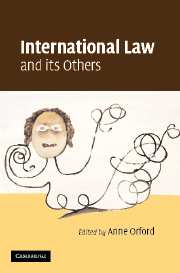Book contents
- Frontmatter
- Contents
- Acknowledgments
- Notes on the contributors
- 1 A jurisprudence of the limit
- PART I Sovereignty otherwise
- PART II Human rights and other values
- PART III The relation to the other
- PART IV History's other actors
- 14 On critique and the other
- 15 Afterword: and forward – there remains so much we do not know
- Index
15 - Afterword: and forward – there remains so much we do not know
Published online by Cambridge University Press: 20 July 2009
- Frontmatter
- Contents
- Acknowledgments
- Notes on the contributors
- 1 A jurisprudence of the limit
- PART I Sovereignty otherwise
- PART II Human rights and other values
- PART III The relation to the other
- PART IV History's other actors
- 14 On critique and the other
- 15 Afterword: and forward – there remains so much we do not know
- Index
Summary
This book is hard to conclude. At the conference where the papers in this book were first presented, we abandoned any attempt to wrap up proceedings. As the conference ended, the questions prompted by the substance and style of the papers and the discussion that followed seemed so broad that we struggled simply to catalogue them.
Looking back, the effort to rethink international law by focusing on its relationship to ‘others’ was illuminating. As in any discipline, it is easy to become preoccupied by the differences within the field. Focusing on differences between international law and things it defines as other to it helped us focus more broadly on the need to think in new ways about our discipline as a whole. Moreover, we did so at a time when conventional images of international law – as ‘the law governing relations between states’ – no longer seem sufficient to describe the global governance regime. The global constitutional order is a diverse, fragmented and chaotic one, in which national and international, public and private legal regimes overlap, struggle for priority and have quite diverse impacts on the ground. We do not, in fact, have a good sociological map of the global regulatory regime – it is more than, and different to, the sum of national and international, public and private law.
- Type
- Chapter
- Information
- International Law and its Others , pp. 401 - 408Publisher: Cambridge University PressPrint publication year: 2006
- 2
- Cited by



